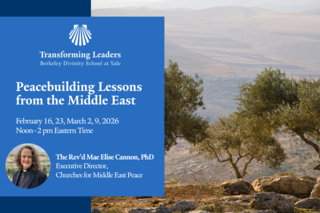Online
Peacebuilding Lessons from the Middle East

Peacebuilding Lessons from the Middle East
February 16, 23, March 2, 9, 2026, Noon–2 pm Eastern Time
The Rev’d Mae Elise Cannon, PhD
This moment in history is marked by profound brokenness and trauma affecting individuals, communities, and nations alike. In a world increasingly divided by conflicts, particularly in the Middle East, Christians from the region offer invaluable insights on resiliently living out one’s faith amidst adversity. This course explores the vibrant, living church in the Holy Land, with a focus on Israel and the occupied Palestinian territories as they strive to deepen their relationship with God through their commitment to peace and justice within their communities.
This course takes an interdisciplinary approach, interweaving history, practical theology, and contemporary ministry practices in peacebuilding. Participants will gain access to essential tools for spiritual formation and advocacy applicable in a variety of ministry settings. A central theme will be the transformative journey of learning to “love one’s enemy,” even in the face of conflict and strife, ultimately equipping learners to apply these lessons in their own lives and ministries. Participants will:
Engage in weekly spiritual practices to connect with God and their community.
- Study and practice the spiritually transformative process of moving from a place of conflict toward peace—within one’s soul, interpersonally, and within their community.
- Consider where conflict and discord exist in their own lives and ministries and directly apply spiritual practices, individually and corporately, to better pursue peace, transformation, and justice.
- Understand the history of the Israeli-Palestinian conflict from a multi-narrative perspective and how diverse theological and political frameworks affect our vocational endeavors.
- Become familiar with the merits and deficiencies of several theories of conflict resolution including just war theory, just peacemaking, and pacifism.
Identify key reasons for apathy in contemporary climates and develop actionable steps to move communities from apathy to advocacy to create meaningful social change.
About the instructor:
The Rev’d Mae Elise Cannon, PhD is the executive director of Churches for Middle East Peace (CMEP), as well an author, speaker, advocate, and academic historian who cares deeply for the poor and the oppressed. She has received a doctorate in American History from the University of California (Davis) focusing on the history of the American Protestant church in Israel and Palestine and a doctorate in Ministry in Spiritual Formation from Northern Theological Seminary. Cannon holds an M.B.A. from North Park University, an M.A. in bioethics from Trinity International University, and an M.Div. from North Park Theological Seminary. She is the author and editor of several books, including A Land Full of God: Christian Perspectives on the Holy Land (2017), and her work has been highlighted in many international media outlets. Cannon is an ordained pastor in the Evangelical Covenant Church (ECC). She has served as the Senior Director of Advocacy and Outreach for World Vision-US, as the executive pastor of Hillside Covenant Church, and as a consultant to the Middle East for child advocacy issues for Compassion International.